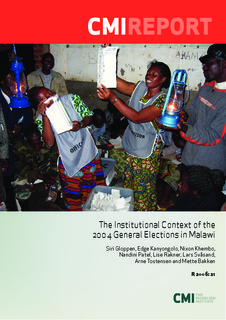| dc.contributor.author | Gloppen, Siri | |
| dc.contributor.author | Kanyongolo, Edge | |
| dc.contributor.author | Khembo, Nixon | |
| dc.contributor.author | Patel, Nadini | |
| dc.contributor.author | Rakner, Lise | |
| dc.contributor.author | Svåsand, Lars | |
| dc.contributor.author | Tostensen, Arne | |
| dc.contributor.author | Bakken, Mette | |
| dc.date.accessioned | 2008-02-20T08:23:48Z | |
| dc.date.accessioned | 2017-03-29T09:13:00Z | |
| dc.date.available | 2008-02-20T08:23:48Z | |
| dc.date.available | 2017-03-29T09:13:00Z | |
| dc.date.issued | 2006 | |
| dc.identifier.isbn | 82-8062-183-0 | |
| dc.identifier.issn | 0805-505X | |
| dc.identifier.uri | http://hdl.handle.net/11250/2435996 | |
| dc.description.abstract | This report summarises the findings of a joint research project undertaken by the Centre for Social Research, Chr. Michelsen Institute and the Universities of Malawi and Bergen. Ensuring that elected political leaders play by the rules of the political game and act in accordance with their mandates without violating citizens’ rights is a challenge for new democracies in sub-Saharan Africa.
Electoral processes essentially begin long before elections actually take place.
The analysis of electoral processes, therefore, requires a long time horizon.
Central political institutions of accountability are analysed to determine the extent to which they have managed to stem executive dominance when put to the test of the parliamentary and presidential elections held on 20 May 2004.
Attention is drawn to four key institutions of democratic governance: (a) those responsible for electoral administration; (b) the party system; (c) parliament; and (d) the judiciary. The electoral cycle – comprising the entire time period from one election to the next – is analysed in six phases: (i) registration of voters and compilation of voters’ roll; (ii) nomination of candidates; (iii) civic and voter education; (iv) the electoral campaign; (v) the polling exercise, including counting of ballots and announcement of results; (vi) conversion of electoral mandate into political positions. The 2004 general elections were judged to be ‘free but not fair’ due to inadequacies in the administration of the electoral process. Civil society organisations as well as domestic and international election observers have emphasised the need to restructure the Malawi Electoral Commission to improve its performance and ensure the legitimacy of the election results. | |
| dc.language.iso | eng | |
| dc.publisher | Chr. Michelsen Institute | |
| dc.relation.ispartofseries | Research report | |
| dc.relation.ispartofseries | R 2006: 21 | |
| dc.subject | Malawi | |
| dc.subject | Elections | |
| dc.subject | Political institutions | |
| dc.subject | Judiciary | |
| dc.subject | Parliament | |
| dc.subject | Electoral commission | |
| dc.subject | Political parties | |
| dc.subject | Accountability | |
| dc.title | The Institutional Context of the 2004 General Elections in Malawi | |
| dc.type | Research report | |
